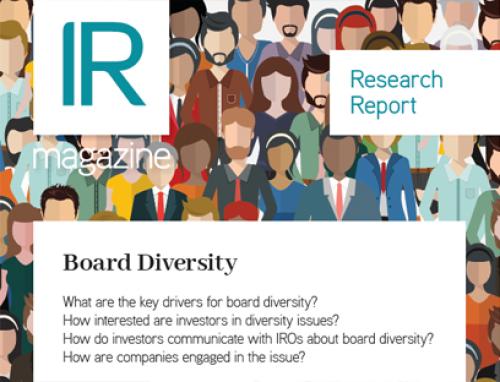Last month, Azerion, the digital entertainment and media company, appointed Marcela Louzada to the newly created role of vice president of IR. She joined from Shell, where she spent nearly 18 years, most recently as director of IR.
Louzada brings to Azerion the experience of helping Shell transform its IR approach over recent years – changes demanded by intense investor scrutiny on the energy sector. She also has plenty of experience in tech, having previously founded two start-ups.

She will now use that experience to build out the IR function at Azerion, which only went public in February this year, listing via a merger with a special purpose acquisition company on Euronext Amsterdam.
Below, Louzada talks to IR Magazine about what attracted her to the new role, her approach to engagement as in-person meetings return, and managing negative sentiment toward the tech sector.
What attracted you to the role?
I was attracted by the opportunity to really make an impact and build on the initial investor engagement work done as part of the listing to develop our equity story, the relationship with the market, sell-side coverage, relationships with investors and how to communicate the message.
Azerion has been growing massively in the last few years and has great potential. It operates in a market that is under consolidation and Azerion is ready to fight as one of the key players in that consolidation – and that’s just the place you want to be.
I think Azerion will benefit from my experience of working at Shell and all the transformation that has taken place in the energy sector over the last couple of years. There was a huge change in the way Shell communicated with the market.
It will be great for Azerion to have those practices. They will help the company transition from private to public, while keeping its entrepreneurial culture, which is important to its DNA. With investors, you don’t have many shots, so it’s good to get it right up-front.
What experience from previous roles do you think will be useful?
I always say I have been flirting with tech for a while because, besides my job in investor relations for Shell, I also founded a number of tech start-ups. Doing that gave me experience not only of starting a business, but also of fund-raising for a company that is not well known where you need to pitch its story.
At Shell, we transformed the disclosures and the market communications over the last couple of years. Two years ago, we would have quarterly calls with the market, just an audio webcast, and the CEO going through a lot of slides.
Today, Shell publishes a 10-minute video, first thing in the morning, so investors can get the message from management early in the day. And then later in the day, you have Q&A with management. By that time, all the noise and clarifications are out of the way, which has massively improved the quality of the Q&A. And that is just one example of all the modernization.
Shell gives me experience on the public company, equity market side, and I also have that experience with start-ups and tech. Azerion is a chance to mix both.
How are you approaching investor engagement as we go back to in-person meetings after the pandemic?
The way I approach it is I always put investors at the center and use the communication channels that best address the demand. I would say at the moment it is a hybrid approach. I get some engagements that are virtual, others that are in person. Some investors even want to come to the office to meet management.
In the case of Azerion, as it is a newly listed company, many investors are just getting to know us. If you are meeting for the first time, I think in-person engagements are important.
We are getting ready for roadshows and conferences in June, along with more in-person meetings. Saying that, we are also doing virtual engagement so we have some virtual conferences we attend. I think the next few months will be more in person than virtual, but we will adapt to whatever works for the investor.
What questions are you expecting from investors and analysts over the next 12 months?
I think there are two areas. The first is more at the company level. Azerion is recently listed, so there is a lot of attention on the company’s financial performance, and how this compares with previous years.
Then at the sector level, I expect a lot of attention. Of course, sentiment toward tech has been somewhat mixed recently, given the big players are publishing worsening results in some KPIs. Other topics that are hot in tech right now are the metaverse and non-fungible tokens. And Azerion has actually been one of the pioneers in that space with our virtual environments.
Does the negative sentiment around tech affect your approach?
I think it’s always important to monitor the sentiment and understand the main drivers behind investor concerns. Is it a macro question – are they just staying away from tech? Or are they asking: how sustainable is tech post-pandemic? That is a pretty fundamental point to address.
I always say you should stay tuned, and look at the concerns behind that behavior and that sentiment, and then work with management to understand what your position is and how to address those concerns. Even if investors aren’t asking about it, we know certain questions are bugging them so I always like to stay ahead of it.










